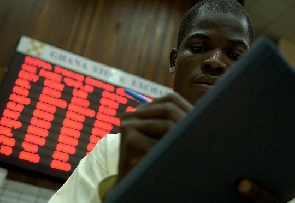- Home - News
- TWI News | TV
- Polls
- Year In Review
- News Archive
- Crime & Punishment
- Politics
- Regional
- Editorial
- Health
- Ghanaians Abroad
- Tabloid
- Africa
- Religion
- Election 2020
- Coronavirus
- News Videos | TV
- Photo Archives
- News Headlines
- Press Release
Business News of Wednesday, 25 March 2020
Source: igsghana.com
IGS FSL investment update for March 20, 2020
Weekly Highlights
*Monetary Policy Rate (MPR) dropped to combat COVID-19 impact on Ghana’s economy.
*Yield on 5-Yr Bond raised by 220 basis points but 91-Day T-Bill eased.
*Ghana Stock Exchange drove further southwards.
*Ghana cedi outmuscled staged missed performance against the three major trading currencies.
*Brent crude oil halved its year opening price to drop to a 3-year low.
Macroeconomic update
MPR dropped to combat COVID-19 impact on Ghana’s economy.
The Monetary Policy Committee of the Central Bank of Ghana, in the week under review slashed the policy rate from 16 percent to 14.50 percent. This measure follows a similar trend adopted by other advanced economies to mitigate the negative effects of novel disease – COVID-19 on global economic growth.
Heightened uncertainty across the global financial markets, sharp downturn of global stock prices and a steep rise in sovereign bonds spreads in emerging markets are said to have influenced the rate cut decision.
On the domestic front, the dampened global demand which is affecting Ghana’s crude oil export earnings and tax revenues as well as the export restriction from advanced economies were cited as factors likely to affect Ghana’s growth leading to a GDP growth of 5.0 percent in the baseline scenario but halved to 2.5 percent in the worst case.
The interest rates on the Government of Ghana treasury bills witnessed marginal moderation in the week under review. The yield on the 91-Day T-Bill dropped by a basis points to settle at 14.75 percent.
The interest rates on the 182-Day and 364-Day T-Bills were however unchanged at 15.18 and 17.80 percent respectively. The 5-year bond which was auctioned in the week under review for both domestic and foreign investors had the yield raised by 220 basis points to 21.70 percent.
The yield on other Government of Ghana treasury bonds and notes were, however, unchanged as they were not scheduled for the week’s auction.
An amount of GHS682.83 million worth of bids was accepted by Government at the week’s auction after accepting all the bids tendered by investors. The GHS754.00 million target was missed and also fell below the GHS889.68 million raised at the previous week’s auction.
An amount of GHS458.53 million was also raised from the sale of the 5-Year Bond bringing total bids accepted to GHS1,141.36 million. Out of the GHS1.14 billion worth of bids raised by the Government, the 91-Day T-Bill dominated with a share of 51.93 percent.
A total of GHS715.00million is targeted for the next week’s auction from the issuance of the 91-Day,182-Day and 364-Day T-Bills.
The yield curve sustained its normality but with marginal moderations on the short-dated treasury securities.
We foresee interest rates on the GoG treasury securities rising marginally in the coming weeks following the heightened uncertainties surrounding the outbreak of the COVID-19 in Ghana and the subsequent reduction in risk taking sentiment, amidst an expectation of rising Government borrowing, to combat the disease spread.
At the close of the week’s trading activities, the Ghana Stock Exchange drove further southward as global financial and stock markets subdued to the fast spreading of the COVID-19.
The astronomical rise in new cases of the COVID-19 disease damped investors risk taking sentiment dragging the market indices further downwards. The GSE Composite Index thus shed 31 basis points to settle at an index level of 2,179.02 points representing a year-to-date loss of 3.46 percent.
The GSE Financial Stocks Index also went down by 46 basis points to close at 1,952.16 points, corresponding to a year-to-date loss of 3.34 percent.











